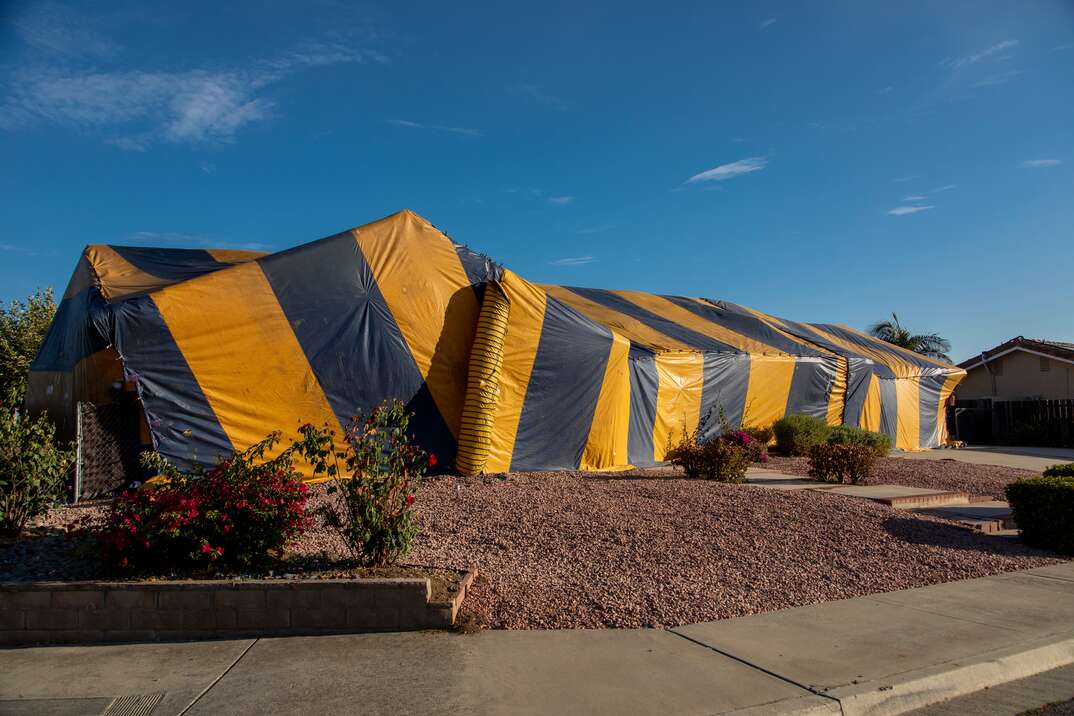- AppliancesElectriciansHVACLandscapingLocksmithPest ControlPlumbingRenovationRoofingT V RepairAll Home Improvement
- Car AccidentClass ActionCorporate LawCriminal DefenseDivorce LawEmployment LawFamily LawFinancial LawLegal AidMedical Injury LawyersMedical MalpracticeReal Estate LawWater Fire RestorationAll Legal
- InvestmentRetirementAll Finance
- Animal InsuranceAutoGeneral InsuranceHealth PolicyHome RentersAll Insurance
- DentalHealth SpecialistsAll Medical
- Animal CareVeterinaryAll Pets
- Auto GlassTowingAll Automotive
How to Prepare for Fumigation Treatment

Tent fumigation can take a few days and is often a final resort for homeowners dealing with a serious termite or pest infestation.
Read More Pest Control Articles
Preparing for termite tenting — or any other tent fumigation — requires a bit of activity on the part of those living in the house.
No, you can't stay in the home during the process of the tent fumigation. Depending on the fumigation company you work with, you might be allowed to be present or move in and out of the space to help prepare it as the tent is going up. However, you must vacate the home before fumigation begins and stay out of it until the company tells you it's safe to enter.
Typically, this means that fumigation preparation includes finding a place for you, your family and your pets to stay during the tenting and fumigation process.
What Can Be Left in the House During Fumigation?
Personal belongings, such as furniture, appliances, dishes, toys and clothing, can stay in your home while it's being fumigated. You typically don't have to protect these items or do anything with them after fumigation, as they won't be impacted. However, you should always follow the instructions of your fumigation professional in these matters.
Other items you don't have to worry about include cosmetics, shampoos, soaps, toothpaste and lotions or other products that are applied externally. This is true even if they are in containers that have already been opened.
Food items that are still in manufacturer-sealed metal, glass or plastic cans, jars or bottles can be left in the home. For example, a glass or plastic jug of milk that has never been opened is safe to leave in the home.
You should remove all living creatures from the home. That includes you, your family and any pets such as cats, dogs, hamsters or reptiles. Talk to your fumigation company about whether you should remove any fish or other creatures in a water aquarium. Depending on the setup and size of your aquarium, you may be asked to leave it and seal it against the fumigation instead of removing it.
You may also want to remove houseplants. Food that has been opened, is stored in resealable containers or comes in pouches or blister packs should be removed or appropriately bagged and sealed. The same is true for items packaged in paper or plastic bags, such as chips or cereals, or in cardboard containers. Eggs, produce, pet food and medicine may also need to be double-bagged or removed from the home. Your fumigation company will provide a checklist and help you ensure that you have properly prepared for fumigation.
More Related Articles:
- What to Look For When Hiring an Exterminator
- Are Pest Control Products Dangerous For Kids and Pets?
- What Are Ultrasonic Pest Repellers?
- 10 Ways to Prevent Termites
- How to Spray for Mosquitoes
What Steps Should You Take to Prepare Your Home to Be Tented?
The following list is not comprehensive to every situation. Always talk to your fumigation company and ask for a checklist if they have one.
- Arrange for your family and pets to stay somewhere for around three days and nights.
- Schedule any gas service to be shut off during the fumigation.
- Move structures, plants or vehicles away from the home if necessary so the tenting can occur.
- Remove or double-bag food as discussed above.
- Remove your houseplants and make arrangements for their care.
- Notify neighbors if necessary to keep them away from your home during the fumigation.
- If asked to do so by your fumigation company, water the ground on the perimeter of your home for several days prior to the tenting.
- Ensure fumigation chemicals can get to all areas of your home by opening all doors, including closets.
- Open all cabinets and drawers.
- If you have waterproof covers on mattresses or other furniture, remove them or vent them.
- Turn off any automated appliances.
- Cut off any items with heating elements or pilot lights.
How Long Does Fumigation Take?
The entire process takes around 72 hours, but it may take longer for larger houses or especially severe infestations. Plan to be away from your home for three days or as long as your fumigation company tells you.
Elocal Editorial Content is for educational and entertainment purposes only. Editorial Content should not be used as a substitute for advice from a licensed professional in your state reviewing your issue. Systems, equipment, issues and circumstances vary. Follow the manufacturer's safety precautions. The opinions, beliefs and viewpoints expressed by the eLocal Editorial Team and other third-party content providers do not necessarily reflect the opinions, beliefs and viewpoints of eLocal or its affiliate companies. Use of the Blog is subject to the
Website Terms and Conditions.The eLocal Editorial Team operates independently of eLocal USA's marketing and sales decisions.



